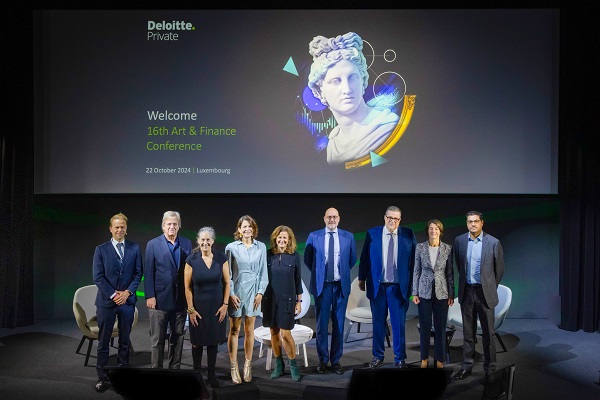 Group picture (L-R): Anders Petterson; Jed Emerson; Laura Callanan; Francesca Sanderson; Caroline Norbury; Adriano Picinati di Torcello; John Psaila; Tonika Hirdman; Nick Tabone;
Credit: Deloitte Luxembourg
Group picture (L-R): Anders Petterson; Jed Emerson; Laura Callanan; Francesca Sanderson; Caroline Norbury; Adriano Picinati di Torcello; John Psaila; Tonika Hirdman; Nick Tabone;
Credit: Deloitte Luxembourg
The sixteenth annual Deloitte Private Art & Finance Conference took place on Tuesday 22 October 2024 at Deloitte's premises in Luxembourg-Gasperich.
As reported by Deloitte Luxembourg, more than 900 people registered from 74 countries joined the event in person and online. The conference featured remarks from 32 prominent international figures in the industry from thirteen countries.
The full-day event focused on exploring the intricate relationship between finance, arts and culture, with various panels offering diverse perspectives on how finance can help support the cultural and creative industries, which account for 5.3% of the EU’s gross domestic product (GDP), according to Eurostat. The conference focused on three main topics: the rise of impact investing in the cultural and creative economy; how philanthropic cultural initiatives can support public good; measuring the social impact of cultural investments.
With this sixteenth edition, Deloitte Private Art & Finance aimed to promote dialogue between social impact and impact investment and the cultural and creative sectors, not only to uncover the opportunity in this unique industry, but to ultimately increase collaboration among family offices, ultra-high-net-worth individuals (UHWNIs) and socially responsible investors as they realise its potential.
The organisers specified that the conference highlighted the challenges in accessing the needed funding, financial models that could support the cultural and creative economy, as well as financial frameworks and products that better reflect the cultural and creative industries ecosystem. Other topics included new philanthropic cultural initiatives and their contribution to the public good, the importance of creative economies increasingly attracting impact investors, as well as learnings from employing inclusive strategies.
The afternoon session focused on building reach and scale to unlock the full potential of cultural impact investing by 2027, the year in which the impact investment movement will have its 20th anniversary.
This was followed by a panel where investment leaders shared their perspectives on possible trajectories of cultural and creative impact funds globally. Topics included: methodologies for measuring, monitoring and reporting the social impact of cultural activities; significant gaps in the familiarity and utilisation of frameworks like UNESCO Culture 2030; transparency in sustainability reporting. As highlighted for the first time in the 2023 ArtTactic and Art & Finance Report, and in February 2024 in the "Arte e iniziative culturali come risorse per la sostenibilità sociale" study by Deloitte Italy and the Università di Pavia, only 38% of respondents are aware of the UNESCO framework, with merely 7% utilising it, and 34.5% do not communicate any sustainability or social performance data.
The conference concluded with a speech on how decentralised finance and Web3 technologies can empower high-net-worth individuals, family offices and socially responsible investors who want to drive positive change within the cultural and creative economy.
Adriano Picinati di Torcello, Director and Global Coordinator of the Art & Finance Initiative, said: "Cultural and creative investing is about recognising the deep impact art and creativity has on our lives, far beyond its monetary value." He continued: "When we mix passion for art with smart financial strategies, we can truly make a difference in preserving culture and supporting creators. With the aid of technology, we have incredible tools at our disposal to create sustainable and innovative investment opportunities in the cultural and creative world. The sixteenth iteration of the Art & Finance Conference was dedicated to exploring these exciting possibilities so we can ensure a vibrant, sustainable future for the arts - one where creativity thrives alongside financial prosperity."
Since 2008, Deloitte Private has studied and celebrated the convergence of finance, culture and business. Each year, international experts gather to discuss the biennial Art & Finance Report's key findings and themes.








